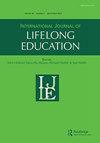公民终身教育:在全球挑战和民主变革中培养知情公民
IF 1.9
Q2 EDUCATION & EDUCATIONAL RESEARCH
引用次数: 0
摘要
在战争、社会冲突、全球气候变化和两极分化被视为对民主共存的威胁的时代,公共话语中反复出现了加强公民终身教育的呼吁(Banks等人,2023;Hurtado 2019;KrzywoszRynkiewicz & Kennedy, 2022;Petrie等人,2019)。随着社会努力应对复杂的挑战和民主价值观的侵蚀,培养知情和参与的公民的迫切需要变得越来越明显。在这篇社论中,我们深入探讨了公民成人教育在促进可持续民主方面的重要性,并探讨了在这一领域进一步研究的潜在途径。这篇社论还旨在探讨俄罗斯对乌克兰战争后公民终身教育的重要性,反思其影响以及在这一领域进一步研究的必要性。本刊在关注公民终身教育研究方面有着悠久的传统。因此,“公民”的概念及其相关主题“公民及其学习”已经成为2010年乃至更早的十年中一个突出和反复出现的主题(Holford et al., 2022)。这种对公民身份的强调反映了对终身教育在培养积极参与的公民方面所起的重要作用的认识。通过研究公民身份的多方面,从理论基础到实践意义,《国际终身教育杂志》促进了关于成人学习如何培养积极为社区做出贡献并为积极的社会变革而努力的公民责任个人的持续对话(例如Bananuka & Mugarra, 2023;李,2017;Ngozwana, 2017)。这篇社论考虑与探索公民身份和成人学习在教育领域的交叉点的长期传统保持一致,并强调有必要将这一研究重点扩展到2010年以后的十年-以俄罗斯对乌克兰的战争为例,作为当前的重大危机,并寻找可能的教育对策。这种对公民成人教育的重视也具有全球性。因此,教科文组织终身学习研究所(UIL, 2022)发布的《全球成人学习与教育报告》(GRALE V)将公民身份和公民教育置于中心位置,认识到它们在成人学习和教育中发挥的关键作用。报告指出,近74%的国家正在制定或实施与公民教育相关的政策,强调其在应对当代挑战方面的重要性日益增加。通过将公民和公民教育放在首位,报告强调需要优先考虑成人公民教育的研究、政策制定和实践,以满足社会不断变化的需求,并支持积极参与的公民。此外,在本刊中,我们强调了全球南方缺乏关注公民教育和公民参与的研究。这些地区的公民成人教育在学术研究和公共讨论中经常被忽视,需要更多的关注(Bananuka和Mugarra, 2023)。在终身教育从业者和学者中,有很多人批评该领域缺乏对民主问题的关注。三十年前,博格斯(1991)就成人教育在服务民主方面的关键作用提出了重要的论点。他认为,在民主社会中,成人教育的主要贡献是公民教育,高于它可能服务的所有其他目的。如果做不到这一点,成人教育就会沦落到成人生活中这一重要方面的边缘,并导致《国际终身教育杂志》2023年第42卷第1期的持续趋势。4,335 - 341 https://doi.org/10.1080/02601370.2023.2234133本文章由计算机程序翻译,如有差异,请以英文原文为准。
Civic lifelong education: fostering informed citizenship amidst global challenges and democratic transformations
Amidst times of wars, societal conflicts, global climate change and polarisations that are perceived as threats to democratic coexistence, there is a recurring call in the public discourse for the strengthening of civic lifelong education (Banks et al., 2023; Hurtado, 2019; KrzywoszRynkiewicz & Kennedy, 2022; Petrie et al., 2019). The pressing need to foster an informed and engaged citizenry becomes increasingly evident as societies grapple with complex challenges and the erosion of democratic values. In this editorial, we delve into the significance of civic adult education in fostering sustainable democracies and explore the potential avenues for further research in this field. The editorial also aims to explore the significance of civic lifelong education in the aftermath of the Russian war against Ukraine, reflecting on its implications and the imperative for further research in this domain. This journal has a long tradition to focus on engagement with civic lifelong education research. So, the concept of ‘citizen’ and its associated topic of ‘Citizenship and its learning’ has emerged as a prominent and recurring theme throughout the 2010 decade and even prior to that (Holford et al., 2022). This emphasis on citizenship reflects a recognition of the vital role that lifelong education plays in fostering active and engaged citizens. By examining the multifaceted aspects of citizenship, from its theoretical foundations to its practical implications, the International Journal of Lifelong Education contributes to the ongoing dialogue on how adult learning can foster civically responsible individuals who actively contribute to their communities and strive for positive societal change (e.g. Bananuka & Mugarra, 2023; Li, 2017; Ngozwana, 2017). This editorial considers aligning with the longstanding tradition of exploring the intersection of citizenship and adult learning in the field of education, and also emphasises the need to extend this research focus beyond the 2010 decade – exemplifying the Russian war against Ukraine as a major current crisis and searching for possible educational responses. This emphasis on civic adult education has also a global dimension. Thus, the GRALE V (Global Report on Adult Learning and Education) published by the UNESCO Institute for Lifelong Learning (UIL, 2022) places citizenship and civic education at its centre, recognising the crucial role they play in adult learning and education. The report states that nearly 74% of countries are developing or implementing policies related to citizenship education, emphasising its growing importance in addressing contemporary challenges. By placing citizenship and civic education at the forefront, the report reinforces the need to prioritise research, policy development, and practice in adult civic education to address the evolving needs of societies and support active and engaged citizens. Additionally, in this journal, we have highlighted the lack of studies focusing on civic education and civic engagement in the Global South. Civic adult education in these regions is often neglected in scholarly research and public discussions, warranting greater attention (Bananuka & Mugarra, 2023). Among lifelong education practitioners and scholars, there have been significant voices criticising the lacking attention of the field to questions of democracy. Three decades ago, Boggs (1991) made an important argument about the crucial role of adult education in serving democracy. He posited that, above all other purposes it may serve, the primary contribution of adult education in a democratic society is civic education. Failure to do so would relegate adult education to the periphery of this vital aspect of adult life and contribute to the ongoing trend INTERNATIONAL JOURNAL OF LIFELONG EDUCATION 2023, VOL. 42, NO. 4, 335–341 https://doi.org/10.1080/02601370.2023.2234133
求助全文
通过发布文献求助,成功后即可免费获取论文全文。
去求助
来源期刊

International Journal of Lifelong Education
EDUCATION & EDUCATIONAL RESEARCH-
CiteScore
3.10
自引率
27.80%
发文量
40
期刊介绍:
The International Journal of Lifelong Education provides a forum for debate on the principles and practice of lifelong, adult, continuing, recurrent and initial education and learning, whether in formal, institutional or informal settings. Common themes include social purpose in lifelong education, and sociological, policy and political studies of lifelong education. The journal recognises that research into lifelong learning needs to focus on the relationships between schooling, later learning, active citizenship and personal fulfilment, as well as the relationship between schooling, employability and economic development.
 求助内容:
求助内容: 应助结果提醒方式:
应助结果提醒方式:


